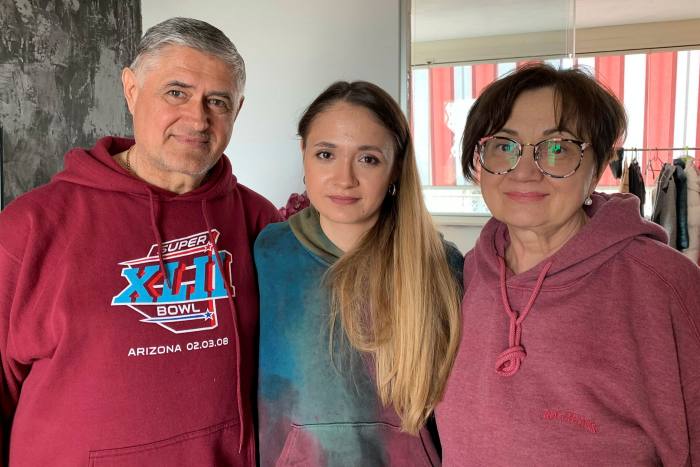As Ukraine’s economy faltered after the collapse of the Soviet Union, math teacher Nadiya Zhekha was paid in flour, vodka and other commodities. Forced to seek better income for her family, she emigrated to Italy in 1996, leaving behind her then 14-year-old son with her eldest daughter.
Zhekha, now 66, has since worked in Italy as a babysitter and carer for people with special needs. But after Russia invaded her homeland, she opened her small apartment in Rome to three Ukrainian war refugees: her daughter and two granddaughters, who met in Lviv a few days after the attacks began and traveled to Rome.
“We didn’t want to leave our homes or our lives, but she convinced us that it was better for our safety,” the eldest granddaughter, Vita Zhakovskha, 23, said outside the Ukrainian church in Rome. Wiping away tears, Zhekha said bitterly that for Russian President Vladimir Putin, “Ukraine is like a doormat to wipe your feet on.”
Since the outbreak of war on February 24, more than 4.3 million Ukrainians have fled their country in search of safety, most taking refuge in neighboring states such as Poland, Moldova and Romania. But others continued on to Western Europe, often finding refuge with family, friends and compatriots who had previously migrated to the region for better job opportunities.
Italy – which had the largest Ukrainian community in Western Europe before the Russian invasion, with around 236,000 people – has so far taken in more than 86,000 Ukrainian refugees and expects up to 175,000 total arrivals if the conflict continues.
“Many refugees choose Italy because they have uncles, grandmothers, neighbors and other connections here,” said Francesca Alice Vianello, a sociologist and migration expert at the University of Padua.
Traditionally, Russia was the first destination for Ukrainians seeking employment abroad. But that changed dramatically in 2014 when differences between Moscow and Kyiv widened, with the former annexing Crimea and Ukraine signing an integration deal with the EU.
Between 2014 and 2019, 3.4 million Ukrainian citizens received residence permits from EU member states for the first time, making the country the bloc’s biggest source of external labor, according to the Center International for Migration Policy Development based in Vienna.
Ukrainians sent a record $19 billion in remittances home in 2021, or around 12% of gross domestic product, according to the World Bank. About two-thirds of these remittances came from Poland. Remittances from Russia have plunged from around 25% of total inflows in 2015 to around 5% last year.

In Italy, women make up nearly 80% of Ukrainian migrants. Many take care of elderly Italians or take on other domestic chores, as Italian women take on more jobs outside the home. Many Ukrainians live in the homes of their employers.
“Over the past 20 years, there has been a strong increase in the demand for care and domestic work to fill the void left by employed Italian women in the labor market,” Vianello said. “The Italian welfare state is not able to meet the demand for care; this demand has been met by migrant women.
While relatives or acquaintances hosted most of the Ukrainian arrivals, some are accommodated in reception centres. The Italian government has allocated 428 million euros to help Ukrainians with housing, healthcare and livelihoods this year.
Some refugees have already found work and their own accommodation. Olena Ivanova, 38, arrived in Italy on March 6, after a six-day trip from her hometown of Kharkiv, Ukraine’s second-largest city which was shelled by Russian forces in the first weeks of the war . The hairdresser landed a job at a salon in Rome and was able to rent an apartment – and several of her clients from Kharkiv arrived too.
“I’m lucky – I could take my profession with me,” she said, adding “Rome makes me feel much better every day.”

Iuliia Khimenko, center, with her parents, Serhii, left, and Svitlana, who fled Kharkiv on March 2. © Amy Kazmin/FT
Iuliia Khimenko, a 30-year-old translator, endured more than a week of anxious days and sleepless nights as her parents rebuffed her calls to join her in Rome. “You’re afraid to fall asleep because you don’t know if you’re going to wake up an orphan,” says the young woman. “But it’s harder to get there than you think. Everything they worked for is there.
His father Serhii, a retired professor of pharmacology from Kharkiv, soon realized that Moscow and kyiv would not quickly resolve their differences.
“We understood that we were in fact the target,” he said. “We are Russian-speaking, and Putin expected us to join them and was happy that the Russians had arrived. When they found resistance, they took revenge by bombarding us so hard.
So, on March 2, the elderly couple walked 10 km to the Kharkiv train station, each carrying a single small bag. After leaving the house at 7 a.m., they managed to board a crowded train after midnight and drove 20 hours to Lviv, with Serhii standing the whole way.
Svitlana, Iuliia’s mother, ran a medical diagnostic lab in Ukraine but said she would “go and clean someone’s house if this continues”, reflecting the “financial challenges of exile”.
For some refugees, however, the physical safety of Italy cannot match the emotional pull of Ukraine.
Zhakovskha, who works for a tech company in her country, and her mother returned to Lviv a few days ago to reunite with their relatives back home. Her 16-year-old sister stays in Rome with Zhekha, the caregiver.
“Every day my grandmother tries to convince us to stay, but it’s hard to live in a foreign country without our money, without work”, said the young woman before her departure. “People don’t want to be refugees. We don’t want to start a new life abroad. I want to be in my place, my country. Everything we have in our lives is there.

